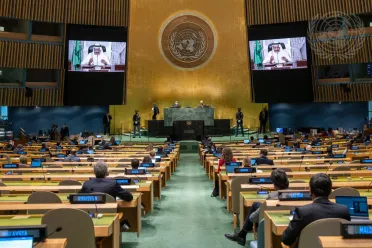Statement
Statement summary
SALMAN BIN ABDULAZIZ AL-SAUD, King of Saudi Arabia, said today’s challenges require strengthened multilateral cooperation, as COVID-19 has shown that the road to recovery hinges on collaboration. Saudi Arabia has helped to lead the response, notably through its 2020 Presidency of the Group of 20, along with its $500 million contribution to international efforts and an additional $300 million to assist States. Recalling that Saudi Arabia is the largest donor of development and humanitarian assistance at the Arab and Islamic level, and among the top three largest donors internationally, he went on to describe its efforts with the Group of 20 and the Organization of the Petroleum Exporting Countries (OPEC) Plus to confront the economic repercussions, as well as to ensure the stability of world oil markets and supplies, protecting the interests of consumers and producers alike.
On climate change, he cited the Saudi Green Initiative and the Green Middle East initiative, drawing attention to Saudi Arabia’s 2030 Vision, which aims to generate prosperity. “We want our economy to be a pioneering one, and our society to interact with all of the world,” he explained. The Government supports local industry, investing in information and communications technology (ICT) infrastructure and energy solutions, and enabling women and youth. He expressed support for dialogue and peaceful solutions, stressing wanting “to set up conditions conducive for development”. More broadly, he said Saudi Arabia strongly supports efforts to find a binding, peaceful solution to the issue of the Grand Ethiopian Renaissance Dam in a manner that protects the water rights of Egypt and Sudan. It also supports peaceful solutions, under United Nations auspices, to crises in Libya and Syria, and efforts to achieve peace in Afghanistan, ensuring the rights of all parts of its society.
“Peace is the strategic choice of the Middle East region,” he explained, expressing support for a just solution on the issue of Palestine, based on the Arab Peace Initiative, ensuring Palestinian rights to establish an independent State along 1967 borders, with East Jerusalem as its capital. In Yemen, terrorist Houthi militias reject peaceful solutions, and are instead placing their bets on a military one, with daily attacks on civilian targets, threatening international navigation and energy supplies. Their approach to the deteriorating Safer oil tanker is one of barter and blackmail.
Recalling Saudi Arabia’s respect for the sovereignty of all States, and underscoring the importance of non-intervention in States’ internal affairs, he said his country maintains its right to defend itself against missile and drone attacks, and categorically rejects any attempt to interfere in its internal affairs. On Iran, he expressed hope that initial talks will increase confidence-building measures to achieve the aspirations of both peoples for collaborative relations, based on principles and resolutions of international legitimacy, and the end of all support to terrorist groups and sectarian militias. The Middle East must be free of all weapons of mass destruction, he assured, expressing support for all efforts aimed at preventing Iran from developing a nuclear weapon. He expressed concern about Iran’s steps that counter its commitments and daily assertions that its programme is peaceful.

